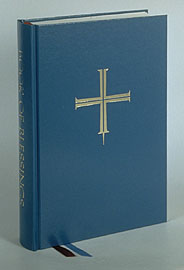
 F YOU HAVE EVER taken a look inside the Book of Blessings, you may have noticed a startling pattern. On page after page, in prayer after prayer, it seems almost as if the author of these texts does not really believe in blessings.
F YOU HAVE EVER taken a look inside the Book of Blessings, you may have noticed a startling pattern. On page after page, in prayer after prayer, it seems almost as if the author of these texts does not really believe in blessings.
That’s a bold claim, I realize, but a look at two seasonal examples will make the point clearer. First, the prayer for blessing an Advent wreath (chapter 47):
Lord God, your Church joyfully awaits the coming of its Savior, who enlightens our hearts and dispels the darkness of ignorance and sin. Pour forth your blessings upon us as we light the candles of this wreath; may their light reflect the splendor of Christ, who is Lord for ever and ever.
That’s a very nice prayer, incorporating traditional Christian imagery of light & darkness and Advent anticipation. But why does it ask God to pour forth His blessings upon “us,” and not upon the wreath?
Compare this with the order for blessing a Christmas manger or Nativity scene (chapter 48):
God of every nation and people, from the very beginning of creation you have made manifest your love: when our need for a Savior was great you sent your Son to be born of the Virgin Mary. To our lives he brings joy and peace, justice, mercy, and love. Lord, bless all who look upon this manger; may it remind us of the humble birth of Jesus, and raise up our thoughts to him, who is God-with-us and Savior of all, and who lives and reigns for ever and ever.
It’s not that it’s not a good thing to ask God’s blessing upon the people who will see the manger, but would it not be better for the blessing of the manger to actually bless the manger?
The question arises: what is the nature of a blessing? Can anything really be blessed, other than ourselves? The tradition of the Church clearly answers yes, and people seem to have an innate sense of this, too.
When people ask me to bless rosaries and crucifixes after Mass (which happily occurs often), I am confident that they are asking me to bless the rosary or the crucifix—not themselves. Their actions alone demonstrate what they believe: that they desire a blessing upon their sacramentals, so that those sacramentals might be set aside for the purpose of leading them to deeper mediation and love for God.
It is perfectly acceptable for lay people to ask God’s blessing upon themselves, their families, their homes, etc. In so doing, they are asking God to look favorably upon them. God, Himself, is doing the work. In the case of a priest, however, he possesses the power and authority to confer blessings, by virtue of his configuration to Christ the High Priest. Ought not the Book of Blessings take advantage of this power?
In Catholic liturgical books of yore, the symbol “ ” would be placed within the text wherever a blessing or Sign of the Cross was warranted. In the two prayers included above (which are, sadly, representative of every other prayer in the Book of Blessings), where would one place the “
” would be placed within the text wherever a blessing or Sign of the Cross was warranted. In the two prayers included above (which are, sadly, representative of every other prayer in the Book of Blessings), where would one place the “ ”? It’s hard to say, and isn’t that a problem?
”? It’s hard to say, and isn’t that a problem?
Mercifully, because priests possess the authority to bless by virtue of their ordination, they are still free to offer true blessings. They are not bound only to use the prayers set forth in the Book of Blessings, but can adapt those prayers or craft new ones.
To what extent, though, have our official prayers of blessing been antithetical to their intended purpose? Is it unfair to suggest that they may have caused many Catholics to devalue the significance of a priestly blessing? The Book of Blessings, like so many of our liturgical books, stands in need of careful revision.

